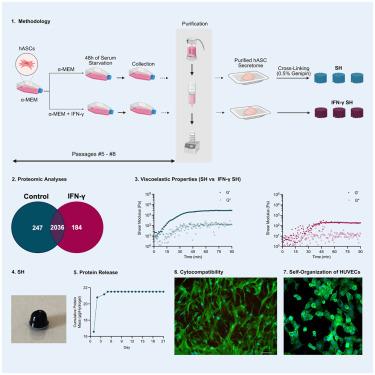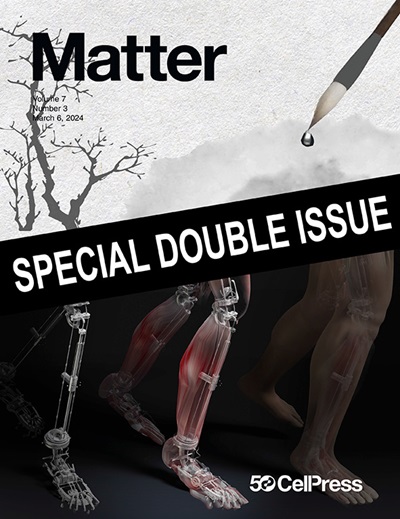Cell secretomes used as sole building blocks enable the fabrication of stable hydrogels for biomedical applications
IF 17.5
1区 材料科学
Q1 MATERIALS SCIENCE, MULTIDISCIPLINARY
引用次数: 0
Abstract
Proteins serve as bioactive components and primary building blocks of hydrogels for bioengineering. While extracellular matrices and blood derivatives from animals and humans have been widely explored, the use of in vitro-cultured cells as bioactive sources remains limited. The cell secretome holds therapeutic potential administered in its liquid form and has been previously incorporated within exogenous materials that confer structural features to secretome-enriched devices. Producing hydrogels exclusively from cell-secreted sources could enhance the predictability, potency, and autologous character of these technologies. Here, we suggest the processing of secretomes derived from adipose-tissue-derived mesenchymal stromal cells (MSCs) and their further crosslinking into volumetric structures. Secretomes from pristine and interferon-γ (IFN-γ)-primed MSCs showed different protein compositions, with high reproducibility between production cycles, generalized high cytocompatibility, and pro-angiogenic activity. The platform introduced herein may be used to explore secretomes of different cell types, targeting applications that may benefit from their therapeutic and biotechnological potential.

细胞分泌组用作唯一的构建块,可以制造用于生物医学应用的稳定水凝胶
蛋白质是生物工程水凝胶的主要组成部分和生物活性成分。虽然已经广泛探索了动物和人类的细胞外基质和血液衍生物,但体外培养细胞作为生物活性来源的使用仍然有限。细胞分泌组以液体形式施用具有治疗潜力,并且以前已被纳入外源性材料,赋予分泌组富集装置的结构特征。仅从细胞分泌的来源生产水凝胶可以提高这些技术的可预测性、效力和自生性。在这里,我们建议处理来自脂肪组织来源的间充质基质细胞(MSCs)的分泌组,并进一步交联成体积结构。来自原始和干扰素-γ (IFN-γ)引物MSCs的分泌组显示出不同的蛋白质组成,在生产周期之间具有高重复性,普遍的高细胞相容性和促血管生成活性。本文介绍的平台可用于探索不同细胞类型的分泌组,针对可能受益于其治疗和生物技术潜力的应用。
本文章由计算机程序翻译,如有差异,请以英文原文为准。
求助全文
约1分钟内获得全文
求助全文
来源期刊

Matter
MATERIALS SCIENCE, MULTIDISCIPLINARY-
CiteScore
26.30
自引率
2.60%
发文量
367
期刊介绍:
Matter, a monthly journal affiliated with Cell, spans the broad field of materials science from nano to macro levels,covering fundamentals to applications. Embracing groundbreaking technologies,it includes full-length research articles,reviews, perspectives,previews, opinions, personnel stories, and general editorial content.
Matter aims to be the primary resource for researchers in academia and industry, inspiring the next generation of materials scientists.
 求助内容:
求助内容: 应助结果提醒方式:
应助结果提醒方式:


